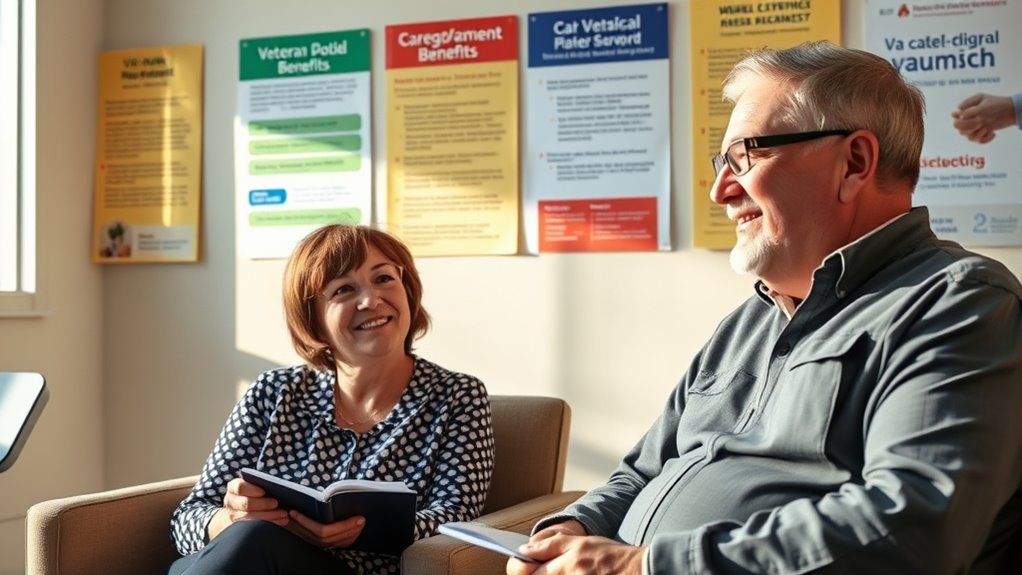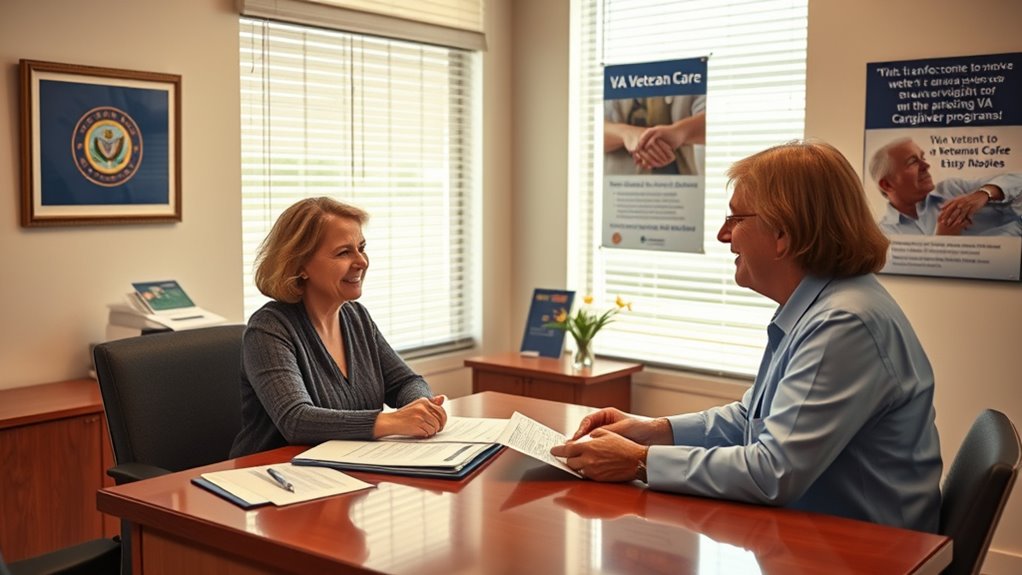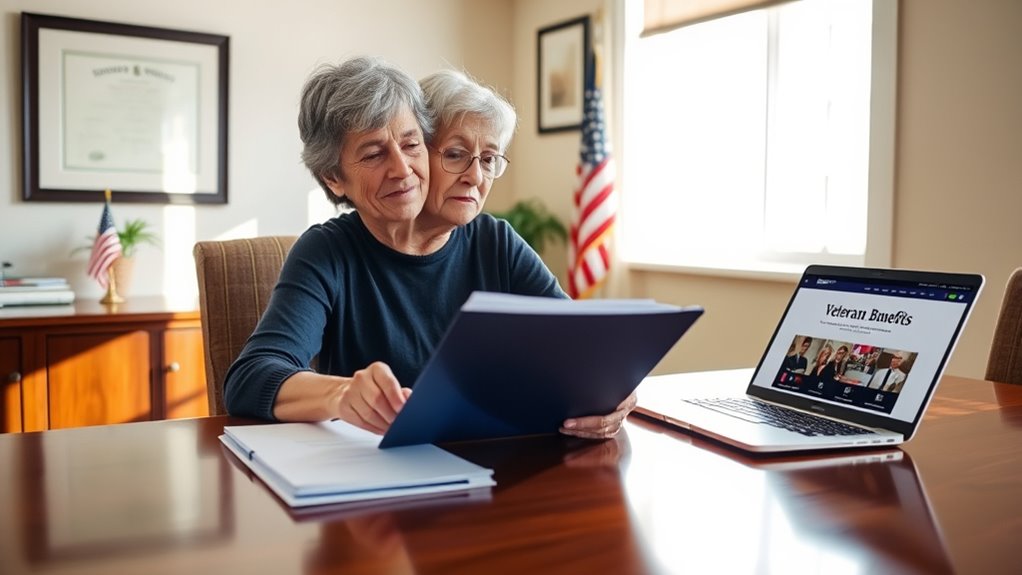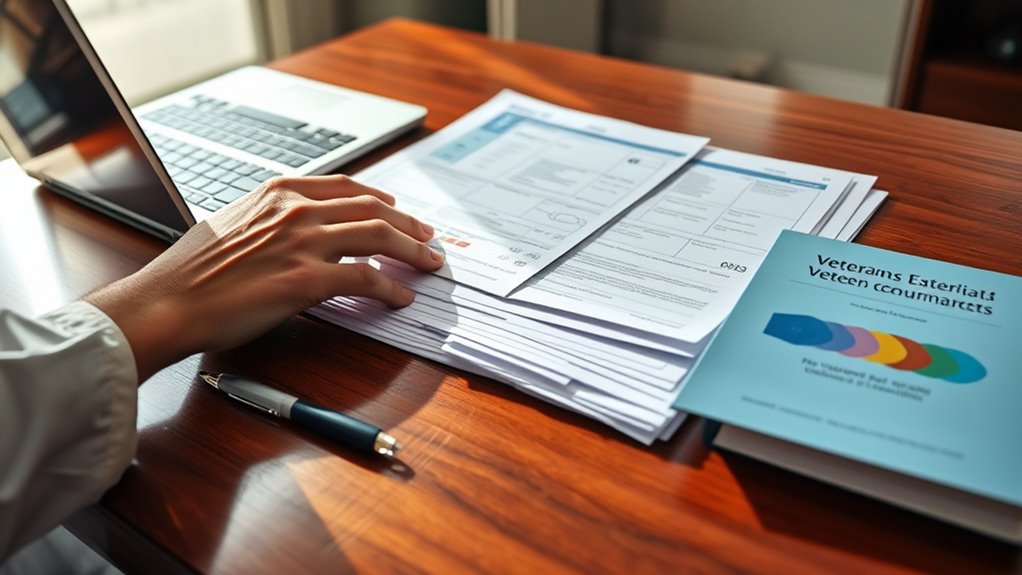As a caregiver of a veteran, you can access a range of VA benefits designed to support your hard work. These include stipends, health benefits like CHAMPVA, mental health counseling, respite care, and training opportunities. Eligibility depends on the veteran’s disability rating and care needs. To maximize your benefits and understand the process, explore the detailed programs and recent updates, which can help you give your loved one the best care possible.
Key Takeaways
- VA caregiver support programs like PCAFC and PGCSS offer stipends, health benefits, training, and respite care for eligible family caregivers.
- Eligibility requires the Veteran to have a at least 70% disability rating and ongoing care needs exceeding six months.
- Caregivers can receive monthly stipends, VA health insurance (e.g., CHAMPVA), mental health counseling, and support services.
- Application involves VA Form 10-10CG, proof of disability, VA healthcare enrollment, and documentation of care expenses.
- Recent policy updates expand benefits to caregivers of veterans injured before September 11, 2001, with ongoing implementation efforts.
Overview of VA Caregiver Support Programs

The VA Caregiver Support Program offers two main initiatives to assist family caregivers of Veterans. These initiatives are the Program of Holistic Assistance for Family Caregivers (PCAFC) and the Program of General Caregiver Support Services (PGCSS).
As a VA Caregiver, you might qualify if the Veteran is enrolled in VA health care and has a service-connected injury or illness. Additionally, many caregivers appreciate the tailored support options available within these programs, which can further enhance their caregiving experience. The integration of holistic design principles can also create a more supportive environment for caregivers and Veterans alike. This approach aligns with the principles of voiceover script optimization, ensuring clear communication and understanding of available resources. Furthermore, utilizing self-watering planter pots can help caregivers manage their time more effectively by reducing the need for constant plant maintenance.
The Program of Holistic Assistance provides eligible Family Caregivers with stipends, health benefits through CHAMPVA, training, mental health counseling, and respite care.
Meanwhile, PGCSS offers peer support, skills training, mentoring, and online resources for caregivers who don’t meet PCAFC eligibility.
Both programs aim to bolster caregiver support, enhancing your capacity to care for Veterans with complex health needs. Additionally, caregivers may benefit from various service packages tailored to assist with their unique challenges and requirements.
Details of the Program of Comprehensive Assistance for Family Caregivers (PCAFC)

When qualifying for VA caregiver programs, understanding the specific support options available can make a significant difference. The Program of Holistic Assistance for Family Caregivers (PCAFC) offers valuable benefits to eligible caregivers, including monthly stipends, health benefits through CHAMPVA, training, mental health counseling, and respite care. Additionally, caregivers may find it beneficial to research cost-effective strategies for managing their financial responsibilities during this time. Caregivers can also improve their own well-being by understanding the importance of color accuracy in maintaining a balanced life while providing care. This VA program is open to spouses, dependent children, and other family members who provide care for Veterans with severe injuries or health conditions, regardless of service era. To qualify, the Veteran must have a VA disability rating of 70% or higher and need at least six months of continuous in-person care. Furthermore, both the Veteran and caregiver must apply together, with the Veteran designating primary and secondary caregivers, which is similar to the key steps in the divorce process where both parties must engage in certain procedures. This program directly supports caregivers of Veterans with significant ongoing needs. Additionally, caregivers can benefit from programs that offer hydration and nourishment for their own well-being during the demanding care process. Understanding the importance of essential oils for stress relief can also provide caregivers with additional tools to manage their stress effectively.
Eligibility Requirements for Caregiver Benefits

To qualify for caregiver benefits, you need to meet specific criteria related to the Veteran’s disability rating, relationship, and care needs. Intelligent Tutoring Systems can offer insights into how to navigate the application process effectively. You must also complete an application process that verifies your role and the Veteran’s eligibility. Understanding the application process can help streamline your efforts in obtaining these benefits. Engaging in this process with full sustained attention can also enhance your understanding of the necessary steps to secure the benefits. Additionally, being aware of filial responsibility laws can help you prepare for any financial obligations that may arise during the caregiving process. Furthermore, having knowledge of equitable distribution can assist you in understanding how any marital property may be divided if a divorce occurs while caregiving.
Veteran Disability Criteria
Eligibility for caregiver benefits hinges on a veteran’s service-connected disability rating, which must be at least 70%. Your VA disability ratings confirm the severity of your service-connected disability, directly linked to your military service. Additionally, understanding the website performance metrics can help caregivers track the effectiveness of their support efforts. Implementing best practices in software quality assurance can also enhance the reliability of tools used by caregivers to monitor their veteran’s needs. Furthermore, advancements in machine learning tech can create innovative solutions for caregivers to better assess and respond to the needs of veterans. Regular audits of these tools can ensure they meet the industry standards for effectiveness and reliability.
To qualify, your disability must have resulted in a medical discharge or been confirmed through VA documentation. The veteran’s need for personal care services must last or be expected to last at least six months, and you must require assistance with Activities of Daily Living.
Eligibility requirements also include enrollment in VA healthcare and the necessity for supervision due to your condition.
Key points include:
- A service-connected disability with a rating of 70% or higher
- Long-term need for personal care services
- Discharge status, either medical or from active service
Additionally, understanding the importance of legal representation can greatly assist veterans and their caregivers in navigating the complexities of the benefits process.
Caregiver Relationship Rules
You must meet specific relationship and living arrangement criteria to qualify as a caregiver for VA benefits. Your caregiver relationship to the Veteran matters — you can be a spouse, child, parent, or a full-time cohabitant. A strong bond, similar to the dad and daughter bond, can enhance the caregiving experience.
To be eligible, you need to provide in-person personal care services, usually in the Veteran’s home or VA-approved facility. Eligibility depends on your family relationship and whether you’re the primary caregiver or a secondary caregiver, like an adult child or grandchild, stepping in when the primary caregiver is unavailable. The VA looks closely at your relationship and living situation to determine if you qualify for benefits. If you meet these criteria, and the Veteran’s disability rating is 70% or higher with significant assistance needed, you can pursue VA caregiver benefits. Additionally, understanding prophetic dreams can help in recognizing the emotional impacts of caregiving on both the caregiver and the Veteran.
Application Process Steps
Starting the application process for VA caregiver benefits requires gathering and submitting the correct documentation to demonstrate both the veteran’s needs and your relationship. You’ll need to complete VA Form 10-10CG and include supporting documentation, such as proof of the veteran’s service-connected disability and care requirements. Additionally, understanding the Louisiana alimony laws can provide insights into how financial support systems work for caregivers. Implementing automation in data analysis can also help identify trends in caregiver needs and streamline the application process.
Key steps include verifying the veteran’s disability rating, ensuring they’re enrolled in VA healthcare, and confirming the caregiving relationship. The process may also involve a VA Compensation & Pension (C&P) exam to evaluate the veteran’s care needs. Additionally, it’s important to understand that caregiver eligibility criteria can vary based on the veteran’s needs and the support being provided.
Remember to:
- Provide documentation of the veteran’s injury and disability
- Prove your relationship or cohabitation
- Meet caregiver eligibility criteria, including age and care requirements
Following these steps ensures a smooth application process for veterans benefits.
How to Apply for VA Caregiver Programs

Wondering how to apply for VA caregiver programs? Begin by reviewing the eligibility criteria, which require the veteran to have a service-connected disability rating of at least 70%.
To start the application process, complete VA Form 10-10CG online on the VA’s website or visit a VA regional office to submit it in person. Be sure to include all supporting documentation, such as proof of the veteran’s care needs and the primary caregiver designation.
Complete VA Form 10-10CG online or in person with supporting documents to apply.
For programs like PCAFC, both the veteran and caregiver must apply together. You may also need to attend a C&P exam to assess the veteran’s care requirements.
If you need assistance, call the caregiver support line at 855-260-3274 or contact your local VA Caregiver Support Program for guidance.
Types of Benefits Available to Family Caregivers

Family caregivers of eligible Veterans can access a range of benefits designed to support their essential role. These benefits include financial assistance, health care options, and support services tailored to caregiver needs.
Depending on the Veteran’s disability rating and care requirements, you may qualify for:
- Monthly stipends through programs like PCAFC, Aid & Attendance, and Housebound Pension
- Access to VA health care insurance via CHAMPVA
- Caregiver support services such as mental health counseling and up to 30 days of respite care annually
Stipends vary based on the program, the Veteran’s disability rating, and local wage rates. Payments can be directed to spouses, children, grandchildren, or other relatives, ensuring that your crucial caregiving role is recognized and supported.
Understanding Medical and Financial Documentation Needs

To qualify for caregiver benefits, you need to gather accurate medical and financial documents that show your veteran’s care needs and expenses.
Proper records of medical costs, disability ratings, and daily care requirements help maximize your claim’s value.
Keeping these documents organized and current ensures smoother processing and fair benefit calculations.
Documenting Medical Expenses
How can you guarantee your medical expenses are properly documented for VA benefit claims? Accurate documentation is *essential* for maximizing VA benefits and ensuring reimbursement.
Keep detailed records of all relevant expenses, including receipts, bank statements, and written agreements with family caregivers. Proper documentation covers a range of medical expenses, such as in-home care, medical supplies, and services provided by family members.
To stay compliant, regularly review VA guidelines on allowable medical expenses. Organize your records systematically to facilitate smooth benefit claims.
Remember to include:
- Receipts and invoices for medical and caregiving services
- Bank statements showing payments made
- Signed agreements with family caregivers
This diligent documentation increases the likelihood of benefit approval and helps you claim all eligible deductions.
Maximizing Claim Documentation
Are you aware of the specific medical and financial documents needed to maximize your VA benefit claim? Proper documentation of medical expenses, including caregiver payments, is vital.
Collect detailed records like receipts, invoices, and proof of payment for caregiving services to substantiate your claim. Clearly specify the nature of medical costs, such as home health aides, therapy, medications, and supplies, to guarantee maximum deductions.
Accurate financial records help VA evaluators verify claim eligibility and prevent delays or denials. Regularly update and organize your medical and financial documentation to improve your chances of a successful claim.
Well-maintained documentation not only supports claim verification but also guarantees all qualifying expenses are considered, ultimately increasing your VA benefits for caregiving.
Ways to Maximize Your Caregiver Benefits

Maximizing your caregiver benefits requires proactive steps and careful management. To enhance your VA benefits, start by meticulously documenting all eligible expenses, including payments to family caregivers, which can boost your benefits enhancement and deductions.
Consulting with VA Planners or accredited representatives helps ensure proper application of policy rules, optimizing your benefit maximization. Regularly review and update your application and supporting documents to reflect any changes in your or the veteran’s condition, potentially increasing your benefits.
Consult VA experts regularly to keep benefits current and maximize your entitlements.
Additionally, take advantage of VA-provided caregiving support services, such as training, mental health counseling, and respite care, which can improve your caregiving capacity and qualify you for additional benefits.
Staying informed about legislative updates can also open new avenues for benefits expansion.
Recent Updates and Policy Changes in VA Caregiver Services

Recent updates and policy changes in VA caregiver services reflect ongoing efforts to expand support for military families, though implementation has faced challenges. The VA expanded the Program of Holistic Assistance for Family Caregivers (PCAFC) to include caregivers of veterans injured before September 11, 2001, starting October 1, 2019, with eligibility extended accordingly.
However, delays in certifying IT systems postponed benefits for veterans injured prior to May 7, 1975, until October 1, 2020, and pushed back the second phase for those injured between May 7, 1975, and September 11, 2001, from 2021 to 2022. These delays caused a one-year postponement in benefits, despite resources being available earlier.
Advocacy groups and Congress continue to push for timely, full implementation of VA Caregiver Support programs.
Resources and Support for Caregivers of Veterans

Have you explored the extensive range of resources available to support caregivers of Veterans? The VA offers numerous assistance programs designed to enhance veteran care and caregiver support.
Discover VA resources and programs to support and empower Veteran caregivers.
For example, the Program of Holistic Assistance for Family Caregivers (PCAFC) provides stipends, health benefits via CHAMPVA, training, mental health counseling, and respite care to eligible caregivers.
The Program of General Caregiver Support Services (PGCSS) offers peer mentoring, skills training, coaching, and online resources without requiring formal application.
To qualify for VA benefits, your Veteran typically needs a service-connected disability of 70% or higher and at least six months of in-person care.
You can also access support through VA’s caregiver support line, online resources, and local VA offices to maximize assistance programs available to you.
Frequently Asked Questions
Does the VA Help Pay for Caregivers?
Yes, the VA helps pay for caregivers through programs like the Program of Complete Assistance for Family Caregivers and pension benefits.
If you’re caring for a veteran with a severe disability, you might receive stipends, training, or respite care.
To qualify, the veteran usually needs a 70% or higher disability rating and require personal care for at least six months.
These payments support your caregiving efforts and help cover related costs.
How Much Will the VA Pay My Wife to Be My Caregiver?
Imagine your wife’s caring hands turning into a steady paycheck. The VA’s program can provide her with a monthly stipend, typically ranging from around $1,500 to over $2,300, depending on your needs.
If she’s your primary caregiver under specific benefits, she could receive up to $2,358. The exact amount hinges on your disability rating, injury type, and program eligibility, turning her dedication into needed support.
How Do I Get Paid to Take Care of a Family Member in VA?
If you want to get paid for taking care of a family member in VA, you need to apply through programs like PCAFC, Aid & Attendance, or the Housebound Pension.
You should meet specific criteria, such as having a qualifying relationship and caring for a Veteran with at least a 70% service-connected disability.
Submit VA Form 10-10CG, attend any required exams, and provide documentation of the care needs.
Once approved, you’ll receive direct deposit payments based on your care responsibilities.
What Form of Support Is Available for Caregivers of Veterans?
Are you wondering what support is out there for caregivers? You can access financial assistance through monthly stipends via programs like PCAFC, Aid & Attendance, and Veteran Directed Care.
Additionally, the VA offers health benefits, mental health counseling, respite care, and training to help you provide better care.
If you’re a relative caring for an eligible Veteran, these resources are designed to support both your well-being and your loved one’s needs.
Conclusion
Exploring the world of veteran caregiver benefits can feel like finding a hidden path, but you’re never alone. With the right guidance and support, you can access valuable resources that truly make a difference. Remember, every step you take helps forge a brighter future for your loved one. Keep exploring, stay informed, and know that assistance is always within reach—your dedication is the greatest gift to those who served.










